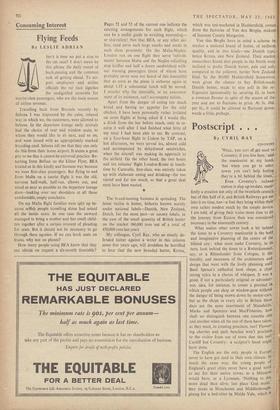Consuming Interest
Flying Feeds
By LESLIE ADRIAN
ISN'T it time we put a stop to the rat race? I don't mean by this phrase the daily round of buck-passing and the common task of getting ahead. To air- port employees and airline officials the rat race signifies the undignified scramble for tourist-class passengers, who are the main source of airline revenue.
Travelling back from Brussels recently by Sabena I was impressed by the calm, relaxed way in which we, the customers, were allowed to behave. In the departure lounge early arrivals had the choice of rear and window seats, to whom they would like to sit next, and so on, and were issued with an appropriately marked boarding card. Sabena tell me that they can only do this from their home airport. It seems a great pity to me that it cannot be universal practice. Re- turning from Belfast on the Ulster Flyer, BEA treated us in this kindly and humane way because we were first-class passengers. But flying to and from Malta on a tourist flight it was the old, nervous half-walk, half-run, elbows out, and stand as near as possible to the departure lounge door—looking over our shoulders at all those comfortable, empty armchairs.
On my Malta flight families were split up be- cause selfish people travelling alone had seized all the inside seats. In one case the steward managed to bring a mother and her small child- ren together after a certain amount of pleading for seats. But it should not be necessary to go through these agonies. If we can book seats on trains, why not on planes?
How many people using BEA know that they can obtain on request a six-month timetable? Pages 52 and 53 of the current one indicate the catering arrangements for each flight, which can be a useful guide to avoiding overeating— or starvation! Not that BEA, or any other air- line, need serve such large snacks and meals in such close proximity. On the Malta-Naples- London run on one flight they serve 'refresh- ments' between Malta and the Naples refuelling stop (coffee and half a dozen sandwiches) with- out warning passengers (most of whom have probably never seen nor heard of this timetable) that as soon as the plane is airborne again at about 1.15 a substantial lunch will be served. I wonder why the timetable, or an announce- ment of its existence, can't accompany tickets.
Apart from the danger of eating too much bread and having no appetite for the cold chicken, I have been personally rather irritated on some flights at being asked if I would like a drink from the bar before lunch, only to re- ceive it well after I had finished what little of my meal I had been able to eat. By contrast, on a four-hour flight to Lisbon by TAP, on a hot afternoon, we were served tea, almost cold and accompanied by dehydrated sandwiches, when the aircraft was Raking its approach to the airfield. On the other hand, the two hours and ten minutes' flight London-Rome at lunch- time by Caravelle, first-class, was entirely taken up with elaborate eating and drinking—far too varied and far too much, so that a great deal must have been wasted.
The brand-naming business is spreading. The latest victim is butter, hitherto known mainly under national labels—Danish, New Zealand, Dutch, for the most part—or county labels, in the case of the small quantity of British butter on the market (60,000 tons out of a total of 450,000 tons last year).
My colleague, Cyril Ray, who so stoutly de- fended butter against a writer in this column some five years ago, will doubtless be horrified to hear that the new branded butter, Krona, which was test-marketed in Huddersfield, comes from the factories of Van den Berghs, makers of Summer County Margarine.
Van den Berghs have in mind a scheme to market a national brand of butter, of uniform quality, and in two kinds—one Danish type, hence Krona, one New Zealand. Their market researchers found that people in the North were inclined to prefer Danish butter, pale and soft, compared to the yellower, harder New Zealand kind. So the 80,000 Huddersfield housewives were given the chance to buy British-made Danish butter, made to stay soft in the re- frigerator (presumably by aerating it), to have a constant flavour in spite of the season of the year and not to fluctuate in price. At 3s. 10d. per lb., it could be allowed to fluctuate down- wards a little, perhaps.






































 Previous page
Previous page